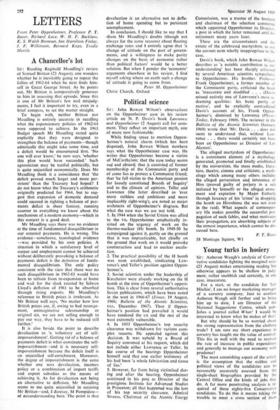LETTERS
From Peter Oppenheimer, Professor P. T. Batter, Richard Luce, W. If. F. Barklam, K. S. Walsh Brennan, Ian Hamilton Finlay, I. F. Wilkinson, Bernard Kops, Trudie Morris.
A Chancellor's lot
Sir: Reading Reginald Maudling's review of Samuel Brittan (23 August), one wonders whether he is inevitably going to repeat the follies of 1962-64 when he next finds him- self in Great George Street. As he points out, Mr Brittan is comparatively generous to him in assessing that episode. Since this is one of Mr Brittan's few real misjudg- ments, I feel it important to try, even in a brief compass, to set the matter straight.
To begin with, neither Brittan nor Maudling is entirely accurate in recalling what the expansionary policies of 1962-64 were supposed to achieve. In the 1963 Budget speech Mr Maudling stated quite explicitly that they were designed to strengthen the balance of payments—though admittedly this might take some time, and a deficit would be encountered first. 'No one will ever know,' he now says, 'whether this plan would have succeeded.' Such agnosticism may be tactful politically, but is quite unjustified economically. Does Mr Maudling think it a coincidence that 'the deficit proved much larger and more per- sistent' than the Treasury had hoped? I do not know what the Treasury's arithmetic originally predicted for 1964, but to sug- gest that expansion of domestic demand could succeed in righting a balance of pay- ments deficit is sheer fantasy, running counter to everything we know about the mechanism of a modern economy—which in this context is a good deal.
Mr Maudling says there was no evidence at the time of fundamental disequilibrium in our external payments. He is wrong. The evidence—conclusive, tautological evidence —was provided by his own policies. A situation in which a satisfactory level of output and employment cannot be achieved without deliberately provoking a balance of payments deficit is the definition of funda- mental disequilibrium. The only policy consistent with the view that there was no such disequilibrium in 1962-63 would have been to refrain from re-expansion at home and wait for the slack created by Selwyn Lloyd's deflation of 1961 to be absorbed through rising exports. Mr Maudling's reference to British prices is irrelevant. As Mr Brittan well says, `No matter how low British prices are, if, owing to bad manage- ment, unimaginative salesmanship or original sin, we are not selling enough to pay our way, they have to be reduced still further.'
It is also beside the point to describe devaluation as 'a voluntary act of self- impoverishment'. Getting rid of a balance of payments deficit is what constitutes the self- impoverishment—and it is necessary self- impoverishment because the deficit itself is an unjustified self-enrichment. Moreover, the degree of impoverishment is the same whether one uses devaluation, incomes policy or a combination of import tariffs and export subsidies as the means of achieving it. As for devaluation not being an alternative to deflation, Mr Maudling seems to me quite unjustified in accusing Mr Brittan—and, I daresay, M Pompidou— of misunderstanding here. The point is that devaluation is an alternative not to defla- tion of home spending but to persistent unemployment.
In conclusion, I should like to say that I share Mr Maudling's doubts (though not always for the same reasons) about floating exchange rates and I entirely agree that 'a change of attitude on the part of govern- ments, and a willingness to make parity changes on the basis of economic rather than political factors' would be a better solution. But when I ponder the 'economic' arguments elsewhere in his review, I find myself asking where on earth such a change of attitude is going to come from.


































 Previous page
Previous page